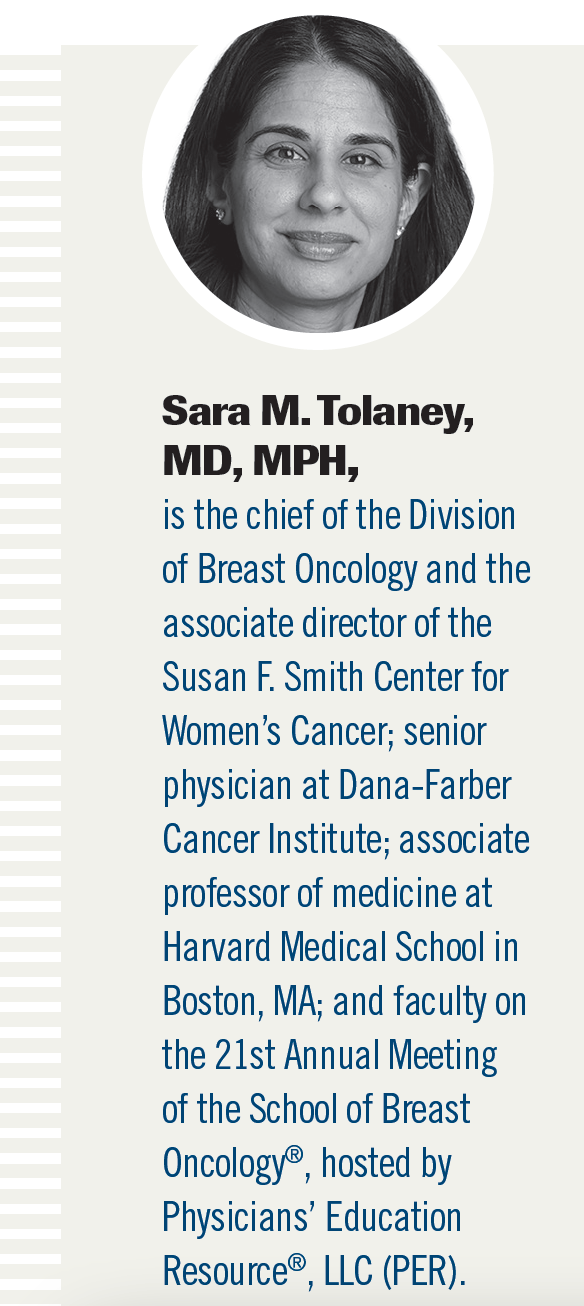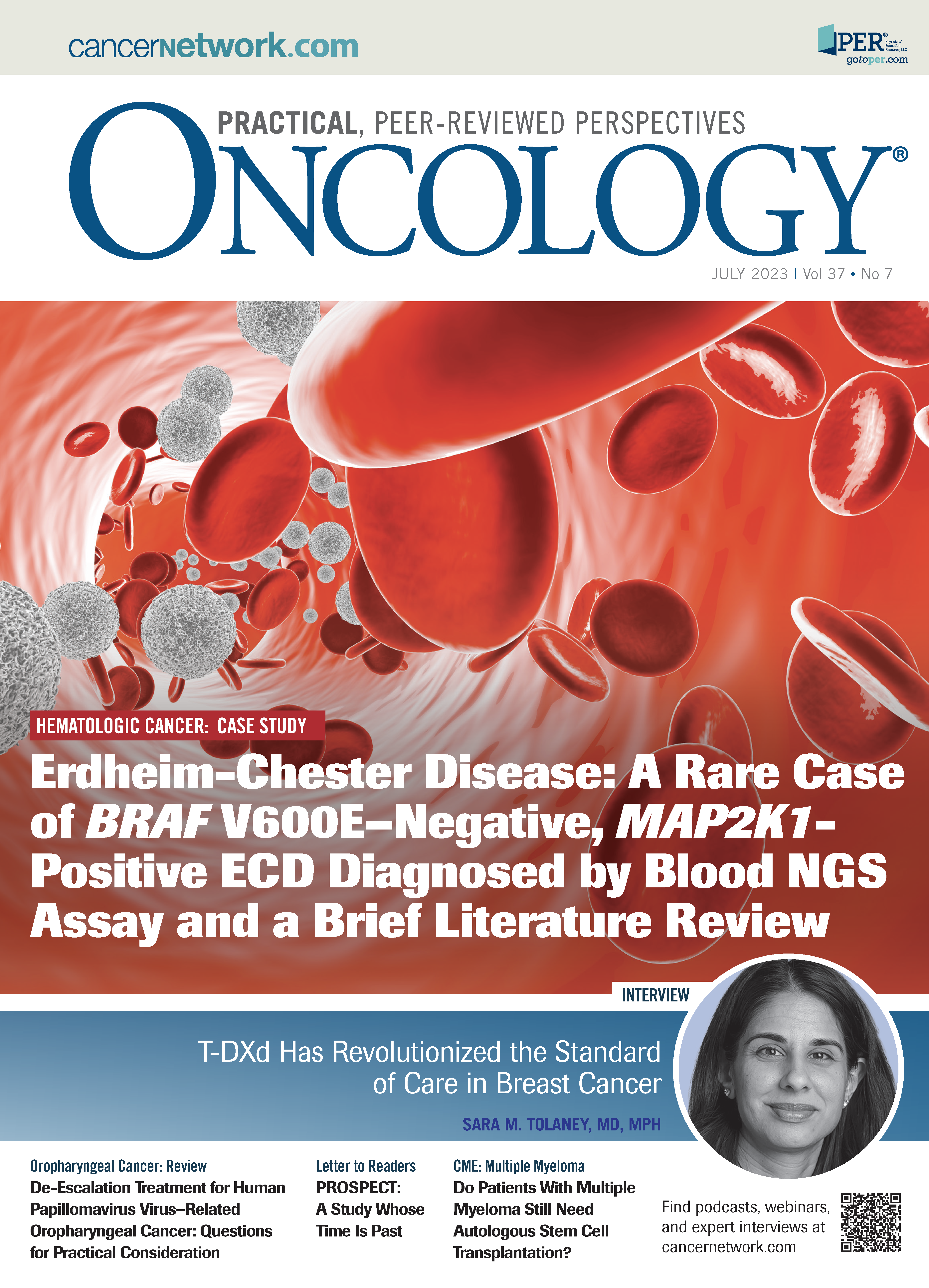T-DXd Has Revolutionized the Standard of Care in Breast Cancer
“I’d love to see us figure out a way to optimize treatment and personalize care. Biomarkers will help us get there, but we also need to be bold in our clinical trial designs.”

Fam-trastuzumab deruxtecan-nxki (T-DXd; Enhertu) has been at the forefront of the breast cancer community since the positive readout of the phase 3 DESTINY-Breast04 trial (NCT03734029) at the 2022 American Society of Clinical Oncology Annual Meeting in Chicago, Illinois. These results ultimately led the FDA to approve this treatment in patients with unresectable or metastatic HER2-low breast cancer who received prior chemotherapy in the metastatic setting or experienced disease recurrence within 6 months of treatment.1
Sara M. Tolaney, MD, MPH, sat down with ONCOLOGY to discuss how T-DXd has affected the current standard of care and where future efforts are focused to improve treatment options. She also examined unmet needs in the breast cancer space and advocated for more clinical trials involving biomarkers to help optimize therapy.
Q: Are there any treatments on the horizon that can affect the standard of care?
TOLANEY: There are some treatments coming along that could [affect] our standard of care. One such drug is T-DXd. We’ve already seen, in the metastatic setting, the tremendous benefits of T-DXd; head to head, it’s better than T-DM1 [trastuzumab emtansine; Kadcyla]. That raises the question: Could T-DXd replace T-DM1 in early-stage disease? The phase 3 DESTINY-Breast05 trial [NCT04622319] is currently studying this [question].
The question comes up of [whether] T-DXd could replace all the preoperative chemotherapy. For example, there’s a trial that’s looking at replacing AC [doxorubicin and cyclophosphamide] plus THP [docetaxel, trastuzumab, and pertuzumab (Perjeta)] with T-DXd, or replacing half of it, so replacing the AC with 4 cycles of T-DXd and following up with THP. That agent does seem very promising given what we’ve seen in the metastatic setting. There are some toxicity concerns that come up, particularly the risk of interstitial lung disease. We will have to look at the efficacy data from these trials and balance them with potential toxicity to figure out how [they] fit in. [T-DXd] has the potential to change the standard [of care].
Q: Can you speak to the importance of the multidisciplinary approach in the breast cancer space?
TOLANEY: Multidisciplinary care in breast cancer is so critical right now. Patients [who come to] Dana-Farber with a new breast cancer diagnosis are seen in combination with our surgical oncologists and sometimes a radiation oncologist up front with the medical oncologist. The reason for this is that these decisions are complicated. Does it make sense for the patient to get systemic therapy before surgery? What about additional tests that need to be done before preoperative therapy? Do they need a lymph node biopsy? What if there’s an area on the imaging that concerns the surgeon and they want a biopsy to understand [whether the patient] will be a candidate for breast conservation? Even more complicated is this whole issue of nodal evaluation at the time of surgery. Can they get away with [evaluating] the sentinel node alone? Do they need an x-ray dissection? Will that influence decisions regarding radiation? Could that change systemic therapy recommendations? It’s so complicated, and it’s nice to be able to have these multidisciplinary discussions with our colleagues so that we make the right decisions for each individual patient.
Q: Looking ahead, what are some unmet needs in the space that you hope are overcome?
TOLANEY: We’ve been successful in early-stage HER2-positive disease. We’re curing more and more patients, and we’re doing so in a way in which toxicities are thoughtfully considered. We are giving some patients too much therapy and some [patients] too little therapy. I’d love to see us figure out a way to optimize treatment and personalize care. Biomarkers will help us get there, but we also need to be bold in our clinical trial designs. We’re learning how to design de-escalation studies, but they’re tricky because you don’t want to undertreat a curable patient and leave them with a recurrence. [These clinical trials] have to be conducted thoughtfully.
We always want to get patient advocates involved in such designs as well. The optimal duration of HER2-directed therapy is still not known. We’ve done multiple trials, but we’re still giving a year of trastuzumab-based treatment. Does everyone need that? Can some [patients] get away with less? Who’s going to need T-DXd in the time to come? We’re going to need to figure that out because there are some potential toxicities. [We want to know whether] some patients can get away with fewer toxic regimens. Who can get away with no chemotherapy? There are patients who can get away with [no] chemotherapy at all, who can just receive antibody-[drug conjugates]. We don’t have predictors [that are] robust enough, and we need to get there. So we’ll continue to see things evolve as we learn how to integrate biomarkers into the early-disease setting.
Q: What do you find most exciting about the 21st Annual School of Breast Oncology meeting?
TOLANEY: One thing I love about the School of Breast Oncology meeting is not only that there are experts who know the field so well and provide the most up-to-date educational sessions on the data but [also that] Joyce O’Shaughnessy, MD, does a phenomenal job of bringing tough case discussions to the forefront. These are the cases we struggle with in the clinic, and it’s helpful to get guidance from the very thoughtful clinicians [in attendance]. The discussions [about these cases] are probably one of my favorite parts of the meeting.
Reference
- FDA approves fam-trastuzumab deruxtecan-nxki for HER2-low breast cancer. FDA. August 5, 2022. Accessed May 17, 2022. https://bit.ly/3BAS4NQ
